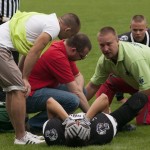 What do you know about concussions? A 2015 Harris Poll report found that 9 in 10 Americans do not know how to define a concussion, although 80% were aware that the injured person doesn’t need to lose consciousness for an injury to be considered a concussion.
What do you know about concussions? A 2015 Harris Poll report found that 9 in 10 Americans do not know how to define a concussion, although 80% were aware that the injured person doesn’t need to lose consciousness for an injury to be considered a concussion.
In this blog post, we’ll take a closer look at this common personal injury.
What is a Concussion?
As we’ve mentioned before, brain injuries can be difficult to detect. They can also easily be missed or misdiagnosed. According to the Centers for Disease Control and Prevention, traumatic brain injuries (TBIs) are a factor in approximately 30% of all injury deaths. “Every day, 153 people in the United States die from injuries that include TBI,” the organization reports.
Concussions are a “mild” form of TBIs because they are usually not life threatening. However, concussions are serious injuries. A concussion is caused by a bump, blow, or jolt to the head, or by a hit to the body that causes the head and brain to move back and forth rapidly. This type of sudden movement can cause the brain to bounce around or twist in the skull.
Top Causes of Concussions
- Sport injuries
- Vehicle accidents
- Falls
- Playground injuries
- Bicycle accidents
- Blow to the head
There may be visible signs of injury, such as bruises or cuts, but in many cases there is no visible injury. An individual with a concussion does not necessarily pass out when the injury occurs.
Signs of a Concussion
Symptoms of a concussion may not be immediately apparent. If you suspect that a loved one has a concussion, seek the advice of a medical professional. Here are general signs of a concussion:
- Headaches
- Dizziness
- Blurred vision
- Ringing in the ears
- Nausea
- Slurred speech
- Vomiting
- Appearing dazed
- Delayed response to questions
Health care professionals generally recommend getting medical help immediately if these symptoms occur after a bump, blow, or jolt to the head:
- Headache that worsens and does not go away
- Repeated vomiting or nausea
- Weakness, numbness, or decreased coordination
- Slurred speech
- One pupil larger than the other
- Convulsions or seizures
- Inability to recognize people or places
- Unusual behavior
- Very drowsy or unable to be awakened
- Increasingly confused/restless/agitated
- Loss of consciousness
Concussion Treatment
After a concussion, the Brain Injury Association of America notes that it’s important to follow the doctor’s orders. Focus on getting lots of rest and don’t hurry to resume normal daily activities. Avoid doing anything that could risk another blow or jolt to the head. Take only medications (including over the counter medications) that are approved by your doctor. Avoid cognitive activities such as computer games and texting. Talk to the doctor about when it’s safe to drive, ride a bike, use heavy equipment, or play sports after the injury.
The brain is more sensitive to damage following a concussion. Repeated concussions or a severe incident can lead to ongoing problems with movement, learning, or speaking.
If you’re concerned that you or a loved one may have suffered a concussion after a trauma, seek medical treatment and advice immediately. If you believe someone is legally liable for a head or brain injury, the next step is to speak with an expert personal injury attorney with experience in brain injury litigation.
Schuerman Law has been working with personal injury claims for over 40 years. John Schuerman will compassionately advocate for injured individuals as well as their families while fighting for full compensation of their claims. Schuerman Law offers evening and weekend appointments in addition to home and hospital visits. If you need to speak with an attorney about a brain injury, contact us to learn how to get the justice and compensation you deserve. Schedule your free consultation today by calling 1-800-274-0045.

